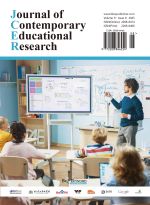Abstract
Objective: To explore the application effect of group cooperative learning combined with flipped classroom in standardized training of emergency surgery resident physicians. Methods: 95 resident physicians undergoing emergency surgery standardized training in our hospital were randomly divided into an experimental group (46, group cooperative learning + flipped classroom) and a control group (49, traditional teaching). The training period was 2 months. Results: The graduation assessment scores of the experimental group were higher than those of the control group (P < 0.05). The improvement in critical thinking ability and self-learning ability was better than that of the control group (P < 0.05). The response rate of “yes” to all items of course teaching satisfaction was significantly higher than that of the control group (P < 0.05). The satisfaction scores for training teachers were higher than those of the control group (P < 0.05). Conclusion: The teaching model of group cooperative learning combined with flipped classroom, through reconstructing the learning process and activating interactive participation, can significantly improve the clinical operation and theoretical foundation of emergency surgery standardized training students. It also cultivates core professional qualities such as critical thinking, self-learning, and team collaboration, providing a feasible paradigm for integrated medical education in this discipline.
References
Arda Y, Kaafarani H, 2025, Perioperative Risk Assessment for Emergency General Surgery in Those With Multimorbidity or Frailty. Curr Opin Crit Care, 31(3): 252–261.
Dabir A, Arnone V, Raza B, et al., 2023, Education Research: Appraisal of Outpatient Clinical Experience During Neurology Residency. Neurol Educ, 2(1): e200046.
Xu Y, Jiang Z, Ting D, et al., 2024, Medical Education and Physician Training in the Era of Artificial Intelligence. Singapore Med J, 65(3): 159–166.
Hsu C, Yang C, Yan SL, 2025, Problem-Solving Method and Cooperative Learning Model in Nursing Education: A Single-Group Pre-Post-Test Study. BMC Nurs, 24(1): 551.
Barranquero-Herbosa M, Abajas-Bustillo R, Ortego-Maté C, 2022, Effectiveness of Flipped Classroom in Nursing Education: A Systematic Review of Systematic and Integrative Reviews. Int J Nurs Stud, 135: 104327.
Zaki H, Yigit Y, Shaban E, et al., 2023, The Utility of the Mini-Clinical Evaluation Exercise (Mini-CEX) in the Emergency Department: A Systematic Review and Meta-Analysis Evaluating the Readability, Feasibility, and Acceptability of Mini-CEX Utilization. Cureus, 15(8): e44443.
Liu Y, Lian X, Chen X, et al., 2024, Practical Exploration of BOPPPS Model Combined With Situational Teaching Method in Clinical Training of Intensive Medicine: Novel Pedagogy and Perception. Front Med (Lausanne), 11: 1442099.
Youssef E, Benabbas R, Choe B, et al., 2024, Interventions to Improve Emergency Department Throughput and Care Delivery Indicators: A Systematic Review and Meta-Analysis. Acad Emerg Med, 31(8): 789–804.
Zipf-Sigler C, Nguyen A, Huang A, et al., 2024, Optimization of a Standardized Letter of Recommendation for Faculty Who Wish to Support Candidates Applying to Surgical Training Programs. Am J Surg, 237: 115716.
Jong N, van Rosmalen P, Brancaccio M, et al., 2022, Flipped Classroom Formats in a Problem-Based Learning Course: Experiences of First-Year Bachelor European Public Health Students. Public Health Rev, 43: 1604795.
Zhou T, Wang H, Li D, 2023, Focusing on the Value of Cooperative Learning in Physical Education: A Bibliometric Analysis. Front Psychol, 14: 1300986.
